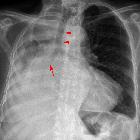Syndrom der inadäquaten ADH-Sekretion (SIADH)
The syndrome of inappropriate antidiuretic hormone secretion (SIADH or SIAD) (also known as Schwartz-Bartter syndrome) was initially described in patients with lung cancer who developed hyponatremia associated with continued urinary sodium loss. The result is often dilutional hyponatremia in which the sodium remains normal but total body fluid increases.
Pathology
Etiology
Inappropriate (excessive) release of antidiuretic hormone (ADH), now known as arginine-vasopressin (AVP), may be caused by :
- malignant tumors, in particular: head and neck cancer, non-small cell lung cancer, small cell lung cancer (representing a paraneoplastic syndrome)
- also: GU and GI malignancies, lymphoma, Ewing sarcoma,
- lung diseases
- infections
- pneumonia (bacterial/viral)
- lung abscess
- tuberculosis
- aspergillosis
- asthma
- cystic fibrosis
- positive pressure ventilation
- infections
- CNS disease
- infections
- encephalitis
- meningitis
- brain abscess
- HIV/AIDS
- hemorrhage
- miscellaneous
- head injury
- hydrocephalus
- cavernous sinus thrombosis
- multiple sclerosis
- Guillain–Barré syndrome
- Shy–Drager syndrome
- delirium tremens
- acute intermittent porphyria
- infections
- drugs
- antidepressants
- selective serotonin reuptake inhibitors (SSRIs)
- tricyclic antidepressants (TCA)
- carbamazepine, oxcarbazepine
- cyclophosphamide, ifosfamide
- hydrochlorothiazide, thiazides
- non-steroidal anti-inflammatory drugs (NSAIDs)
- vincristine
- neuroleptic agents
- AVP analogs: desmopressin, vasopressin, oxytocin
- chlorpropamide
- clofibrate
- MDMA ("ecstasy")
- antidepressants
Treatment and prognosis
The optimal therapy for SIADH is to treat the underlying cause. If this is not possible, or if the disease has become refractory, other treatment methods are available such as water restriction, demeclocycline therapy, or in severe cases infusion of hypertonic saline together with furosemide during careful monitoring.
History and etymology
In 1957 William B Schwartz and colleagues (including the American endocrinologist Frederic Bartter) an American nephrologist first described the syndrome of inappropriate antidiuretic hormone secretion. ‘Inappropriate’ was employed because of the observed loss of the normal linkage between ADH secretion and serum osmolality .
Siehe auch:
und weiter:

 Assoziationen und Differentialdiagnosen zu Syndrom der inadäquaten ADH-Sekretion (SIADH):
Assoziationen und Differentialdiagnosen zu Syndrom der inadäquaten ADH-Sekretion (SIADH):
